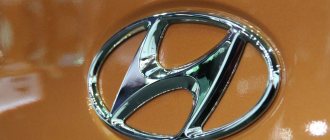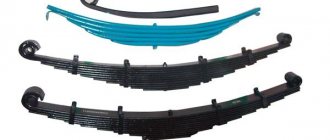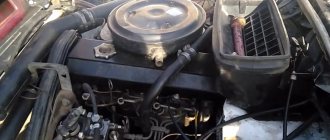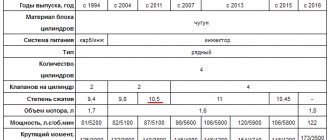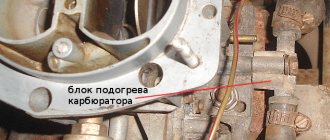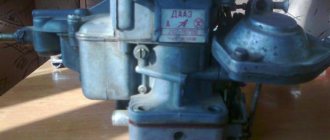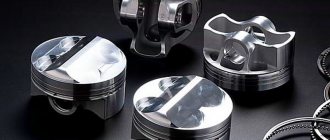Most VAZ-2115 models have a four-cylinder injection engine. There are options with other engines, but the classic “fifteenth” moves precisely with the help of an injector with an improved lubrication system. They began producing such power plants in 1994. Over more than twenty years of service, they have proven themselves to be easy-to-use and reliable motors. Let's figure out what characteristics the VAZ-2115 engine has.
Which engine is better: 1.5 liter 8-cl. or 1.6 l 8-cl?
When choosing a car, people often ask the question: “Which engine is better?” In our case, everything is not so simple. A similar question may arise if we consider buying a car from already “shaggy” years: 2006-2007. It was during this period that VAZ-2113, 2114 and 2115 were equipped with both 1.6 liter and 1.5 liter engines, the characteristics of which are outlined above.
In fact, they are no different, except for volume, exhaust standards, fuel supply systems and a pair of sensors. Therefore, the main distinguishing point is the engine size. A difference of 0.1 liters gives more torque from the bottom, adds a little maximum power and, perhaps, the same or even lower fuel consumption than 1.5 liters. The only negative is that it is noisier at idle.
Previously, in the years 2008-2012, people were reluctant to buy 1.6 liter models, saying they were loud, prone to breakdowns, etc. In fact, it is superior to the 1.5 liter engine in all respects. Accordingly, we recommend it to you. But this applies to 8-grade students. motors that were installed serially. Next, let's look at 16-cl.
Consumption and travel range – Engine capacity 15
| Why is the VAZ 2115 high fuel consumption - AutoTop At first, related cars VAZ-21099 and VAZ-2115 were produced at the plant in parallel, until in 2004 the fifteenth model completely replaced the VAZ-21099. To lower the speed or bring the speed to an average speed, make the gas-dynamic boost angle smaller and increase the angle of the opening exhaust valve. |
- Regularly replace the air and fuel filter. ...
- Monitor the condition of the spark plugs and replace them according to the recommendations.
- Periodically measure the tire pressure level and monitor the condition of the brake system parts.
General features of the internal combustion engine design • The car never let me down, although I found myself in different situations.
Which engine is better, 1.6 16- or 8-valve?
16 classes the engines were installed in a limited series at AvtoVAZ or at the SuperAvto subsidiary. They were also installed by tuning fans themselves.
In terms of manufacturability, they are superior to 8-cl. engines. Accordingly, if there is an option to take a 16-cl. motor, it would be nice to go with this option. But everything has its own nuances.
Advantages of 16-valve engines over 8-valve engines
- The best cylinder blowing is more power.
- More stable engine operation - less noise.
- Greater efficiency means lower fuel consumption.
However, 16th grade. the engine (1.6 l) from Priora (21126) bends the valves when the belt breaks. For some reason this scares many people. You just need to monitor the condition of the car, belts, rollers, pump, then everything will be fine! On all modern cars the valves bend.
Specifications
| PARAMETER | MEANING |
| Years of manufacture | 1994 – present |
| Engine weight, kg | 124 |
| Cylinder block material | cast iron |
| Supply system | injector |
| Type | in-line |
| Engine displacement | 1.5 |
| Power | 78 horsepower at 5400 rpm |
| Number of cylinders | 4 |
| Number of valves per cylinder | 2 |
| Piston stroke, mm | 71 |
| Cylinder diameter, mm | 82 |
| Compression ratio | 9.8 |
| Torque, Nm/rpm | 116 / 3000 |
| Environmental standards | EURO 4 |
| Fuel | AI 93 |
| Fuel consumption | 7.3 l/100 km combined cycle |
| Oil | 5W-30, 15W40 |
| Oil volume | 3.5 |
| When replacing, pour | 3.0 liters |
| Oil change carried out, km | 15 thousand |
| Engine life, thousand km - according to the plant - in practice | 150+ 200+ |
Oil change video. Engine 16 model 21126
Avoid driving on an empty tank as this increases the risk of detonation due to a lean air/fuel mixture and also exposes the fuel pump to unnecessary wear. After it warmed up thoroughly, I installed the car over the pit and jacked up the front right side for better drainage of used oil.
| Data source | City | Route | Mixed | Idle | |
| Official (AI-92) | 10.30 | 6.00 | 7.60 | – | |
| Real (General) | 10.17 52 | 6.69 42 | 8.66 42 | 1.06 35 | |
| Real fuel consumption grouped by fuel type | |||||
| Real (AI-92) | 9.97 37 | 6.67 30 | 8.58 30 | 1.06 26 | |
| Real (AI-95) | 10.68 15 | 6.73 12 | 8.88 12 | 1.05 9 | |
| # | Locality | Region | Consumption | Qty |
| Tolyatti | Samara Region | 8.00 | 1 | |
| Rostov-on-Don | Rostov region | 8.00 | 1 | |
| Astrakhan | Astrakhan region | 8.00 | 1 | |
| Nizhny Novgorod | Nizhny Novgorod Region | 8.70 | 2 | |
| Voronezh | Voronezh region | 8.95 | 2 | |
| Kirov | Kirov region | 9.00 | 1 | |
| Chelyabinsk | Chelyabinsk region | 9.00 | 1 | |
| Moscow | Moscow | 9.33 | 3 | |
| Permian | Perm region | 9.50 | 2 | |
| Nalchik | Republic of Kabardino-Balkaria | 9.75 | 2 | |
| Krasnodar | Krasnodar region | 9.83 | 3 | |
| Saratov | Saratov region | 10.00 | 1 | |
| Barnaul | Altai region | 10.00 | 1 | |
| Tuapse | Krasnodar region | 10.00 | 1 | |
| Pushkino | Moscow region | 10.00 | 1 | |
| Krasnoyarsk | Krasnoyarsk region | 10.07 | 3 | |
| Naberezhnye Chelny | Republic of Tatarstan | 10.10 | 2 | |
| Volgograd | Volgograd region | 10.30 | 1 | |
| Izhevsk | Republic of Udmurtia | 10.40 | 2 | |
| Ekaterinburg | Sverdlovsk region | 10.45 | 2 | |
| Cheboksary | Chuvash Republic | 10.50 | 2 | |
| Biysk | Altai region | 11.00 | 1 | |
| Kyzyl | Republic of Tyva (Tuva) | 11.00 | 1 | |
| Buzuluk | Orenburg region | 11.00 | 1 | |
| Vladikavkaz | Republic of North Ossetia (Alania) | 11.00 | 1 | |
| Tyumen | Tyumen region | 11.00 | 1 | |
| Omsk | Omsk region | 11.00 | 1 | |
| Ryazan | Ryazan Oblast | 11.40 | 2 | |
| Syktyvkar | Komi Republic | 11.75 | 2 | |
| Orenburg | Orenburg region | 12.00 | 1 | |
| Vologda | Vologda Region | 12.00 | 1 | |
| Saint Petersburg | Saint Petersburg | 12.00 | 1 | |
| Ufa | Republic of Bashkortostan | 12.25 | 2 |
Description
The VAZ 2115 engine was developed on the basis of engine modification 21083. The only differences are the presence of an injector, which replaced the aging carburetor, a modified camshaft and a floating connecting rod pin.
- In total, the new engine turned out to be 6 horsepower more powerful than its predecessor. At the same time, the power unit has become more responsive and provides confident traction at various speeds. Like its predecessor, this engine has a belt drive, which somewhat complicates maintenance work.
- If the belt breaks, the valves do not bend, which eliminates the need for complex repairs. The motor itself turned out to be quite reliable and has a service life of 150 thousand kilometers. When following all service recommendations and careful operation, mileages of 200 and 300 thousand kilometers are not uncommon.
- The four-cylinder engine is cast from a durable cast iron alloy, which improves temperature resistance. It is practically not subject to overheating, which allows you to operate the car in difficult conditions and under maximum loads.
- In general, impressions of the VAZ 2115 engine are positive. It is moderately powerful, reliable and easy to maintain. However, you shouldn't expect miracles from him. From 1.5 liters of volume, VAZ engineers managed to extract only 78 horsepower. Whereas engines of similar volume in modern cars produce at least 100 horsepower.
- The average fuel consumption, which is 7.3 liters in mixed mode, also does not shine. This engine is also not without characteristic breakdowns, which, although not critical, can cause a lot of problems for the car owner.
What sensors affect the fuel consumption of the VAZ 2115?
Malfunctions of the air flow sensor (or absolute pressure sensor), lambda probe, and phase sensor (camshaft position) have a noticeable effect on gasoline consumption. But the “dying” of the crankshaft sensor more often leads to the fact that the engine completely stops starting.
In the last few years, fuel consumption of about 6 liters per 100 km has been considered optimal in terms of economy. Fuel consumption of the Lada 2115 Samara ranges from 7.3 to 7.8 liters per 100 km. Lada 2115 Samara is available with the following types of fuel: Gasoline AI-92, Gasoline AI-95.
Fuel tank design
The main function of a fuel tank is to store a certain amount of fuel. At the same time, everything must be organized so that the likelihood of a fire hazard is minimized.
On VAZ cars the fuel tank is located under the rear seats. Due to this placement, in the event of serious accidents and car overturns, the tank in most cases remains undamaged. VAZ fuel tanks are made of leaded steel sheets. Thanks to a thin layer of lead that protects against corrosion, the service life of the tank is significantly increased. The outside of the fuel tank is covered with dark enamel.
The fuel tank, covered with dark enamel, is reliably protected from corrosion
The fuel storage volume of the VAZ 2108 and other similar models is 43 liters. This takes into account the reserve, but it is not recommended to fill the tank to the brim. You should always leave a free volume of about four liters. It is especially important to do this in the summer, since the fuel expands as the temperature rises. If the tank is filled to the brim, then after swelling it may simply burst. The volume of the VAZ gas tank is designed in such a way that the autonomous mileage is enough for 500 kilometers, and this is considered a normal road segment in modern conditions.
The tank is securely fixed to the car body using flexible and durable plate-type clamps. Rubber gaskets must be placed under the clamps to ensure a tighter connection.
The tank mounting plates are very flexible and durable
Gasoline is poured through the neck on the right (in the direction of travel) rear side of the body. It is closed with a screw cap.
The neck of the VAZ 2115 tank is closed with a tight lid
Main elements of the fuel tank
The neck is connected to the tank cavity through the filler hose. The other two tubes are integrated with a seven-liter separator installed outside the tank and designed to capture gasoline vapors. As a result of wear, the separator may split along the seam and gasoline will begin to leak out. It can be replaced without dismantling the tank. Moreover, you can temporarily cover the separator seam with a gasoline-resistant sealant.
Owner reviews
00000095000000, 2108-1103010-11 Order code 001428 Manufacturer DAAZ 2 reviews Looks like a semi-finished product, there is no gasket between the cap and the neck, which means gasoline vapors will escape, I don’t know, maybe I got such a copy, but this is a VAZ-2108 fuel tank cap with a code lock Applicable show Article 2108-1103010КД all Articles additional. To understand this issue in more detail, it is necessary to consider all the reasons and nuances that affect the decrease or increase in fuel consumption.
Maintenance
This power unit is not demanding on service, so the oil in the VAZ 2115 engine is changed every 15 thousand kilometers, and it is possible to use inexpensive semi-synthetic and mineral oil.
We only note the need to replace the timing belt, which is done every 50 thousand kilometers.
One of the serious shortcomings is the lack of hydraulic compensators, which forces the car owner to adjust the valve clearance manually every 10 thousand kilometers.
To perform this service work, the valve cover must be removed and the clearances measured and adjusted. This is quite a complex service job and it is difficult to do it yourself.
The main culprits of overspending
Monitor the main parameters of the gas distribution system, valve timing, valve fit to the head seats, wear of the cams, camshaft bearings and timing gears, condition of the cylinder head gasket and head, clearances between the bushings and valve stems, depth of valve recessing in the cylinder head seats. It received a power of 90 horsepower, which accelerated the car to 185 kilometers per hour, while the time to reach the first hundred was reduced and required only 11.
VAZ 2114 engine structure
As was said earlier, the 2114 was equipped with five different power units, which differed in power and valve mechanism. Three of them had 8 valves, and the other two had 16. The gas distribution mechanism had a belt drive.
Until 2007, the engine was equipped with a simple on-board computer, which did not regulate the operation of the engine based on sensor readings. Therefore, the motorist had to regulate the processes the old fashioned way, manually. Since 2007, an ECU was installed, which, receiving data from sensors, independently adjusted many processes.
Design features of the engine. Since the second generation had a so-called two-way electronic engine control unit, it is worth considering what electrical circuit was installed.
Electrical diagram of a VAZ 2114 car.
Malfunctions
| FAULTS | CAUSES AND REMEDIES |
| The engine does not start or runs with detonation and strong vibrations. | Injection system failure. It is necessary to open the engine, clean the injectors and check their functionality. |
| The engine is shaking, the idle speed is floating. | The throttle sensor or idle speed control has failed. Repairs are made only after a thorough diagnosis and consist of replacing the failed element. |
| The engine takes a long time to warm up or does not reach operating temperature at all. | The thermostat failed, which closed the circulation of liquid along a large circuit. The repair consists of replacing the thermostat. |
| The appearance of an extraneous knocking sound in the engine under load. | Valves are knocking and require adjustment. Repair in this case involves opening the engine and adjusting the valve clearance. |
Tuning
There are several possible ways to increase engine power. Let's talk about these tuning options in more detail:
- Chip tuning of the VAZ 2115 engine will not allow you to obtain any noticeable effect. Even by replacing the engine control unit, the car owner will be able to get 3-5 horsepower, the increase of which will be almost imperceptible.
- Deep engineering tuning of VAZ 2115 engines, which involves replacing the camshaft and other power elements, will increase the engine power to 85 horsepower. Such an increase of 10 horses will already be noticeable, and the car will accelerate faster, especially from low revs.
- Replacing the throttle body and exhaust will increase power to 95 horsepower.
- If the engine power limit of 100 horses is important to you, then you need to install lightweight valves, mill the cylinder head and replace the intake manifold. A car with such a tuned engine will accelerate 1-2 seconds faster than with a basic 78-horsepower engine. A further increase in power by replacing internal power parts will not allow you to obtain the desired horsepower, and the service life of the motor is significantly reduced.
- An alternative way to increase the power of a VAZ 2115 engine is to install a compressor with a pressure of about 0.5 bar. If the compressor is properly configured, the engine power will be about 120 horsepower. At the same time, when resorting to such tuning, the car owner must be prepared to reduce the service life of the engine, which may require appropriate major repairs after only 75-100 thousand kilometers.
